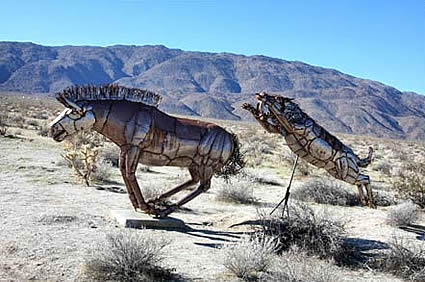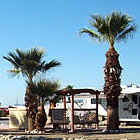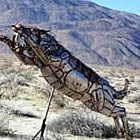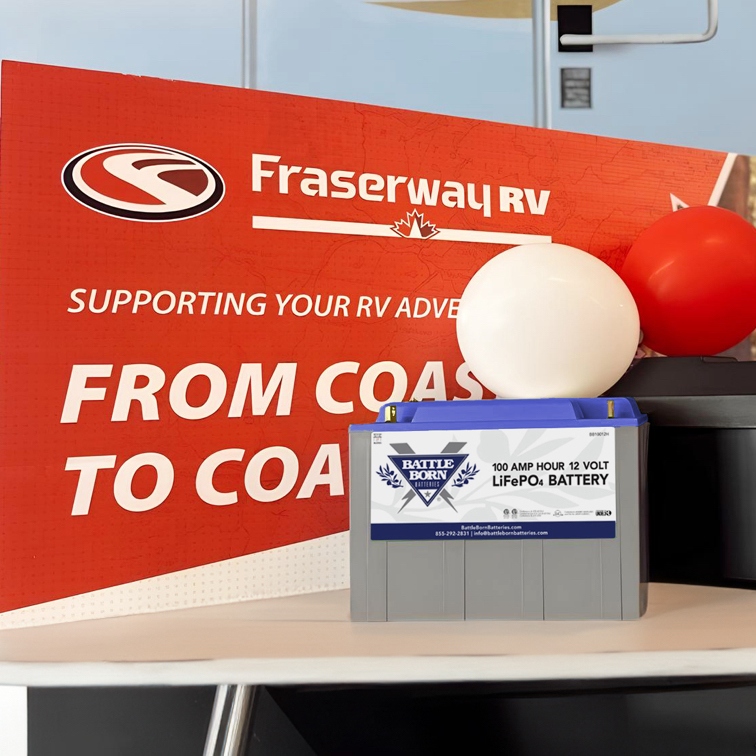Exploring the California desert
Borrego Springs and the surrounding area are made for recreational pursuits

Many RVers have a goal when they travel. We call ours the “alpha and the omega.” We have been to the highest National Wildlife Refuge in the USA (8,240 feet) and now we are at the lowest refuge (-227 feet). As low as our present location is, it must rank high in things to see and do. We travelled almost 3,600 miles from cold, damp northern Vermont to warm, dry southern California. Both places were surrounded by water but the scenery could not be more contrasting. Let us tell you about what we have seen.
Our first excursion was to Borrego Springs, which is in the middle of Anza-Borrego Desert State Park, the largest state park in California. Borrego Springs is a small, compact community with a college, many shops and a beautiful library. The Chamber of Commerce office is the best place to start your visit, as it has a knowledgeable and friendly staff and plenty of literature on what is going on in the area. On the other end of the roundabout (yes, they do have a real roundabout), the Borrego Desert Nature Center displays a wide variety of books and items on the desert, along with many books on nature and some pottery. One could easily spend an hour in this one shop alone.
Adventurous activities
The Performing Arts Center has lectures on Friday evenings (sunset in the winter comes early) on a variety of topics. These range from wind birds (hawks) to night skies to ecology. The town has a “night sky” mentality, so the stars are very easy to see and study. For the golf enthusiasts, there are four golf clubs in the immediate area. There is much to do in Borrego Springs. You immediately obtain a flavour for this place as you enter the town on Highway 78, for you travel through Galleta-Meadows Prehistoric Animal Cultures. These are metal sculptures of Sabertooth Lions, Tortoises, Elephants, Camels, llamas and a Gomphotherium lining the highway. You will not see that in many places!
Surrounding Borrego Springs is the desert and Anza-Borrego Desert State Park—at 600,000 acres, it is the largest in California. As Mark C. Jorgensen, the park superintendent, says, “This park is preserved forever, for the deep, palm-filled canyons, lofty crags, wrinkled badlands and endless vistas provide a lifetime of exploration and tranquility for our generation and many generations to come.”
The park has 500 miles of back-country roads, unlimited hiking trails, guided nature walks and unobscured views of the night skies. There is a small vehicle entrance fee and camping is provided for at six locations. Opportunities for back-country camping exist at eight sites. The visitor centre, however, is the best attraction for the less adventurous. It is open Thursday through Mondays, 9 a.m. to 5 p.m. and only open on weekends during the hot months, when the temperature may hit 110 °F.
The building is built into the side of a hill and contains many exhibits portraying life in the desert. It is also the starting point for nature talks and walks, guided tours and Jr. Ranger programs. Some of the flora, fauna and wildlife one might see outside of the centre are ocotillo, cholla, peninsular bighorn sheep, roadrunners, black-tailed jackrabbits and different types of hummingbirds. A short stay here will take a few hours and visitors usually return to see what they missed on their first visit.
Sand dunes and mud hills
Getting back to the activities that are more adventurous then hiking, there are outdoor recreational areas (a.k.a. the sand dunes). The Imperial Sand Dunes Recreational Area, administered by the Bureau of Land Management (BLM), is located just past the Arizona border, off of Interstate Highway 8. Here one can escape from reality on a dune buggy or dirt bike. These are the largest dune masses in California, extending for more than 40 miles in a band averaging five miles wide. Dunes often reach a height of 350 feet above the desert floor. There are three areas to explore: Mammoth Wash—a more isolated area; the North Algodones Dunes Wilderness Area—accessed by foot or horseback only; and the Algodones Dunes area between I-8 and Highway 78. There are many primitive camping sites and a user fee is charged.
Between the Salton Sea and Anza-Borrego Desert State Park lies Ocotillo Wells State Vehicular Recreation Area, a collection of mud hills, washes and sand dunes. Off-roading is popular here, with more than 40,000 acres open for desert riding. ATVs, dirt bikes, motorcycles, jeeps and trucks modified for desert sand are seen here. At that end of the day, a biker can spend the night near his machine in a primitive campground or in one slightly more organized. RVers can easily drive off the paved road and onto a hard packed trail to the back of a dune and set up shop away from everybody. It is that easy and many, many RVers do just that.
A recreational region
Recreation in the dunes is taken very seriously by Californians. There is an organization, The American Sand Association that works to educate people who traverse the sand dunes (a.k.a. duning), instilling environmental awareness, safety and the “rules of the road on the sand” to its members.
So, what started out as a trip into the desert to collect supplies for the Refuge at a little town led us to a huge State Park, two recreational areas and a whole new way of how other people live in their RV. As the sun sets over the Salton Sea, we reflect on all we have seen and done in our first two weeks here. We are now planning to take our fifth wheel RV into the dunes and personally experience what it is all about. But first, there are a few more stories to tell about some of the other interesting places in this area. Watch this space!








